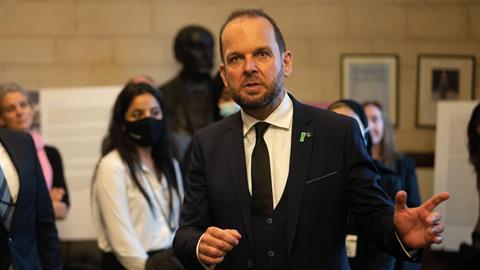As MPs cast a critical gaze over the Legal Services Act, the Legal Services Board came under fire last week
The Legal Services Act, which established the current framework for regulating legal services, came into force on 30 October 2007. On Tuesday this week, holding an evidence session on the subject, the House of Commons justice select committee asked: is the act still fit for purpose?
‘Yes’ was the answer from representatives of the bar and legal executives – though solicitor MP James Daly (pictured), a member of the committee, disagreed. ‘Anybody could open a law firm and they could then hold client money. It seems utterly perverse,’ he said.
But while most committee members seemed content with the status quo, the evidence suggested that when the committee’s inquiry reports it may have something to say about one legacy of the 2007 legislation – the Legal Services Board.
‘When the act was passed, you’ll remember that arms-length bodies were subject to triennial reviews,’ bar chair Nick Vineall KC told the committee. ‘Everyone would have expected the LSB to have a review every three years.’
Those rules have changed, the committee heard. ‘We’ve now got a position so there is no regular review of the LSB. You can’t mark your own homework indefinitely. We think every regulator – every confident, transparent regulator – ought to welcome external review of its activities every now and again. There hasn’t been a review of the LSB since 2017, and it has changed course a bit since 2017. We think it’s time for a 360 review,’ Vineall said.
An example of alleged LSB over-reach was its 2021 strategy for reshaping legal services. ‘It is slightly troublesome to us that the LSB has on several occasions expressed the view that it thinks the regulatory system would be better for consumers if there were a single regulator,’ Vineall said. ‘I suppose they’re entitled to that view, but that’s not the job that parliament has given to them. There’s a risk that they regulate as they think the system ought to be rather than in accordance with the system which parliament created.’
'We’ve now got a position so there is no regular review of the LSB. You can’t mark your own homework indefinitely'
Nick Vineall KC, Bar Council chair
The LSB’s sector-wide strategy appeared well into the board’s life, Vineall noted. ‘One can in a sense say rhetorically, either they went 10 years without a strategy they ought to have, or they’re doing something now which really goes beyond their remit. That’s a question that could sensibly be looked at.’
The LSB’s internal governance rules (IGRs) set out the requirements to be met by approved regulators to ensure an adequate split between their regulatory and representative functions. Vineall wanted to know if the IGRs, which were last reviewed in 2018, are driving too strong a wedge between the approved regulator and the body to which it delegates its regulatory functions.
One concern, he said, is the LSB’s tendency to try and take the lead on issues such as SLAPPs (strategic litigation against public participation) and NDAs (non-disclosure agreements). LSB consultations and material on SLAPPs and NDAs ‘go much broader into general questions’ that are not specifically problems of regulation.
All of this comes, Vineall said, against the background of the 14% budget increase the LSB proposed for itself this week. ‘Ultimately it’s the professions who pay and ultimately it’s going to be the consumers who pay.’
The committee later heard that the LSB’s proposed spending increase – on top of last year’s 9% budget rise – will also affect the work of frontline regulators. CILEx Regulation chair Jonathan Rees observed that his organisation will have to find another £70,000 to pay for it. Is it right that the oversight regulator should be taking money away from the frontline regulators? That is a legitimate question to ask, Rees averred.
CILEx Regulation meets the LSB regularly and they have a ‘good open dialogue’, he said. But Rees wants to see the board ‘be more of a coach actually working with the regulators, trying to spread best practice’ and not ‘a pedantic headmaster ticking us off’.
CILEX – which is of course seeking to ditch CILEx Regulation in favour of the SRA – believes the LSB has a ‘very broad view’ of its role. ‘I’m not sure they are the best people to take a view on climate change or judicial appointments,’ CILEX chair Professor Chris Bones said. ‘They could and should have a much more focused view about the performance of the delegated regulatory bodies.’
What do the Law Society, Solicitors Regulation Authority and, importantly, the LSB itself think? The committee will hear from all three on Tuesday.





































15 Readers' comments